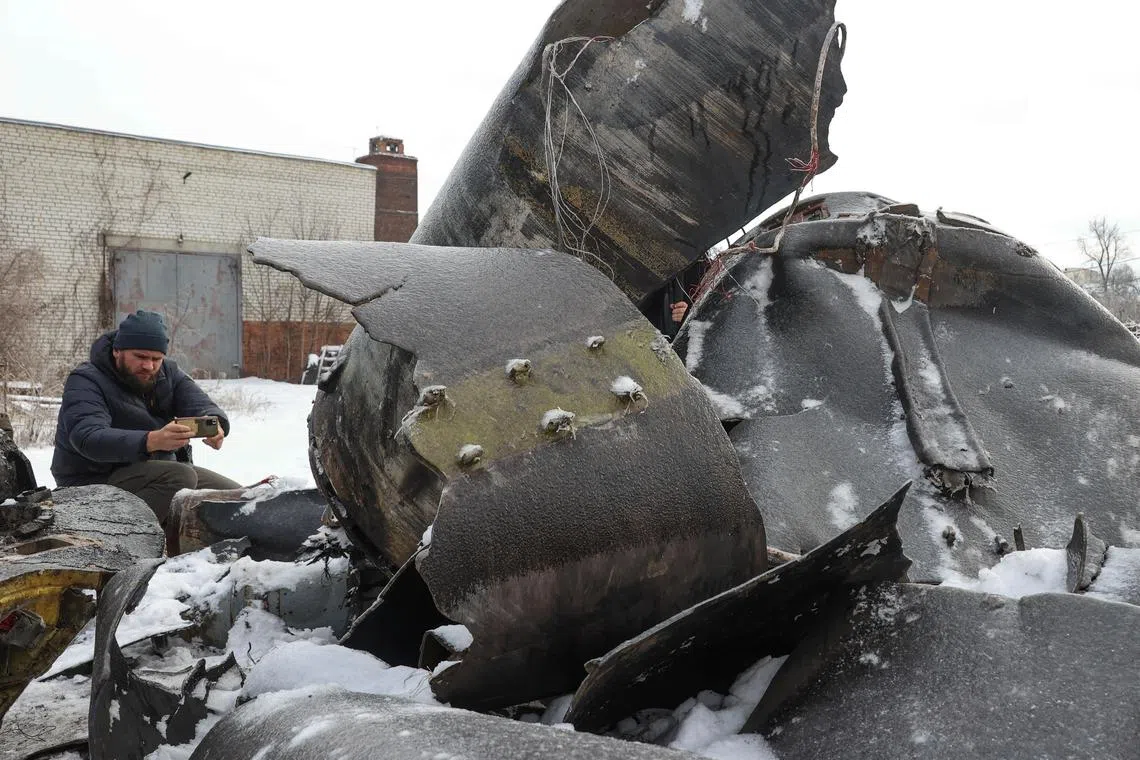North Korea set to send new class of missiles to Russia, Seoul says
Sign up now: Get ST's newsletters delivered to your inbox

The US has accused North Korea of supplying munitions to Russia that are interoperable with the Soviet-era weaponry it has deployed in Ukraine.
PHOTO: REUTERS
Follow topic:
SEOUL – North Korea is looking to step up its military cooperation with Russia by sending Moscow new types of tactical guided missiles
Mr Kim Jong Un’s regime appears to be planning for a trial of atmospheric reentry of a warhead designed to be carried by an intercontinental ballistic missile to the US mainland, Mr Shin Won-sik said in an exclusive interview with Yonhap News published Jan 11.
This would mean firing a long-range rocket a distance of several thousand kilometres, he said.
The cooperation outlined by Mr Shin would mark a new phase of Mr Kim’s assistance for Russian President Vladimir Putin in his war on Ukraine
By sending more weapons of greater sophistication, Mr Kim is likely receiving substantial aid that keeps his sanctions-hit economy afloat as well as technology from Russia that increases the security threat North Korea poses to the US and its allies in the region – South Korea and Japan, weapons experts have said.
“North Korea said it will deploy (close-range ballistic missiles) with front-line troops. Given the recent arms trade, North Korea could sell them to Russia,” Mr Shin told Yonhap.
North Korea first tested close-range ballistic missiles in April 2022 with an estimated range of about 100km to 180km, Mr Shin said.
Visits by the North Korean leader to munitions factories
More than a year ago, the US accused North Korea of supplying munitions to Russia that are interoperable with the Soviet-era weaponry it has deployed in Ukraine.
Since then, the cooperation has grown to include short-range ballistic missiles, the US said last week.
Moscow and Pyongyang have repeatedly denied the accusations.
Mr Shin added the flow of munitions may have reached more than two million rounds.
North Korea is estimated to have provided around 5,000 containers of weapons to Russia as of the end of December that could hold some 2.3 million rounds of 152mm shells, Yonhap reported the minister as saying.
If North Korea sold shells at US$1,000 (S$1,330) each, the amount so far provided by Pyongyang would be equal to about 10 per cent of North Korea’s GDP, according to Bloomberg News calculations.
That is a conservative estimate because high demand has driven up prices, with the 155mm shells used by Nato forces priced at about US$3,000 each.
Mr Shin said North Korea has been preparing to test a new type of intermediate-range ballistic missile (IRBM). It could come as early as this month after Pyongyang conducted two engine tests in November, he said.
An IRBM is designed to have a range that would be long enough to hit all of Japan and US military facilities in Guam, where the Pentagon says it keeps one of America’s largest munitions depots in the world.
White House National Security Council spokesman John Kirby told reporters in Washington that Russia is working with North Korea to evade sanctions.
“I’ve said it many times that certainly, Russia’s benefiting militarily by the purchase of North Korean ballistic missiles,” Mr Kirby said, adding the missiles have been used in strikes on Ukraine.
While the Biden administration officials said this month they plan to raise the latest developments at the United Nations Security Council, there may be little that Washington can do to stop trade in illicit goods between North Korea and Russia.
Satellite imagery of North Korea’s Najin port
Russia’s envoy to the UN, Mr Vassily Nebenzia, spoke at a Security Council meeting on Jan 10 and accused the US of spreading “false information” about arms transfers with North Korea. REUTERS

